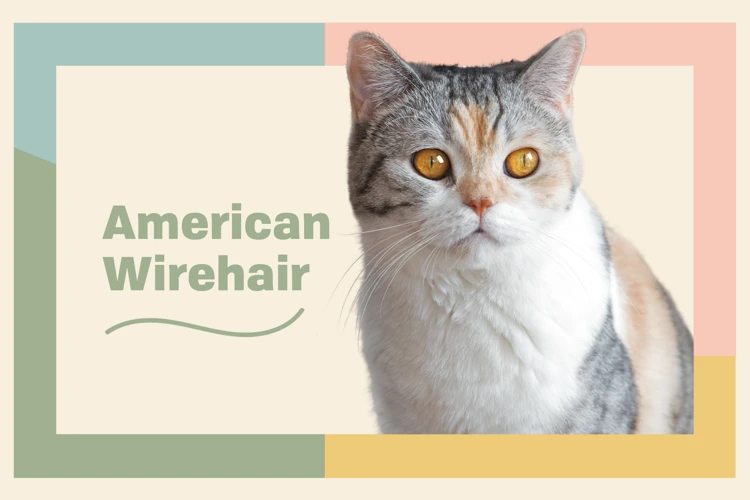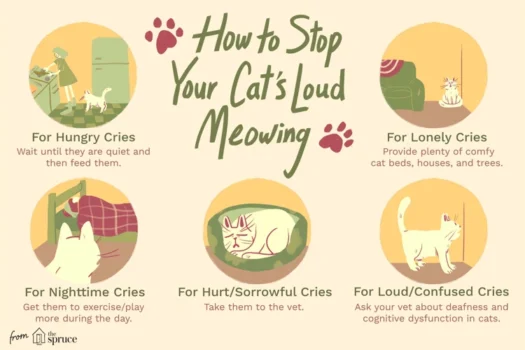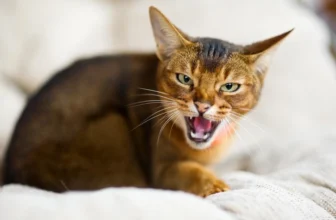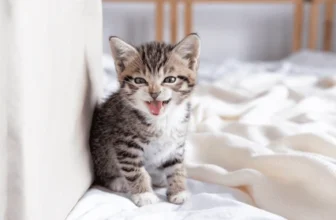Do you have an American Wirehair that meows excessively? Does it leave you feeling perplexed and wondering what you can do to address this behavior? Excessive meowing in cats can be caused by a variety of factors, including health concerns and environmental triggers. As a cat owner, it’s essential to understand why your cat is meowing excessively and what you can do to help. In this article, we’ll discuss steps you can take to address excessive meowing in your American Wirehair and create a safe, comfortable environment for your furry friend.
Understand Why Your American Wirehair is Meowing

Understanding why your American Wirehair is meowing excessively is the first step in addressing this behavior. Cats use meowing as a form of communication, but excessive meowing can be indicative of an underlying issue. From body language to health concerns, there are various reasons why your cat may be meowing excessively. In this section, we will explore the different reasons why your American Wirehair may be meowing excessively. Understanding these reasons will help you address the root cause of the behavior and develop a plan to stop it.
Body Language and Sounds
Body Language and Sounds
Meowing is one of the ways our American Wirehair communicates with us. Understanding their body language and the different types of sounds they make can help us interpret their needs. Here are some of the common body language and sounds that American Wirehairs make:
- Arched back and raised fur – indicates fear, aggression or excitement.
- Purring – shows contentment or sometimes anxiety.
- Flat ears and dilated pupils – indicates fear or aggression.
- Hissing – warns of threatening situations or to show dislike.
- Chirping – indicates excitement or prey drive.
- Chattering – a sign of frustration or excitement, usually seen when the cat is watching birds or squirrels.
It’s important to pay attention to your American Wirehair’s body language when they are meowing excessively. This can help determine if they are trying to communicate something specific, such as being hungry, thirsty, bored or in pain. Addressing the underlying reason for the excessive meowing can help reduce this behavior.
If your American Wirehair is meowing excessively and you are not sure what the underlying cause is, try monitoring their behavior closely, and take notes. You may be able to detect patterns and find solutions to stop the excessive meowing. Additionally, if you notice any changes in your cat’s behavior or they appear to be in pain, it is important to consult a veterinarian to rule out any medical conditions that may be causing the excessive meowing.
Pro Tip: To learn more about the causes of excessive meowing in American Wirehairs, check out our article on Excessive Meowing in American Wirehairs.
Understanding Triggers
Understanding the triggers that cause your American Wirehair to meow excessively can be the first step towards solving this issue. Identifying what causes your cat’s behavior can help you address the root cause of the meowing. Here are some common triggers to consider:
- Hunger: If your cat’s meowing is accompanied by excessive food consumption, then your cat is likely hungry. You can set a feeding schedule for your American Wirehair to avoid overfeeding and minimize meowing. Check our previous article on understanding American Wirehair’s body language to know if it is time for your cat to eat.
- Boredom: Sometimes, American Wirehairs meow out of boredom. They require sufficient stimulation and exercise to prevent excessive meowing. Providing toys and activities, as well as playing with them regularly, can keep your cat entertained.
- Loneliness: As social creatures, American Wirehairs may feel lonely when left alone for extended periods of time. This can lead to separation anxiety, which can manifest in excessive meowing. Check our previous article on separation anxiety in American Wirehairs to know how to minimize the pattern of meowing.
- Pain or discomfort: Certain health issues, such as urinary tract infections or dental problems, can cause pain and discomfort in cats. This can lead to meowing as a way of seeking attention or expressing discomfort. Check our previous article on medical conditions in American Wirehairs to know about the health concerns.
- Old age: Older cats may experience cognitive decline or hearing loss, which can lead to excessive meowing. They may also experience increased anxiety due to unfamiliar surroundings. Creating a safe and comfortable environment for your cat can help reduce anxiety.
Identifying triggers may require patience and observation. Nevertheless, if you can identify the cause of the excessive meowing and take action accordingly, you can help your American Wirehair reduce unnecessary vocalization. In the next section, we will discuss some tips on how to address this behavior. To learn more about preventing meowing with playtime, check out our previous article on playing with an American Wirehair.
Health Concerns
One of the reasons your American Wirehair may be excessively meowing is because of potential health concerns. As a responsible pet owner, it is essential to understand and address any health issues your pet may be facing.
Here are some common health concerns that may cause excessive meowing in your American Wirehair:
| Health Concerns | Symptoms |
|---|---|
| Urinary tract infections (UTIs) | Straining while urinating, blood in urine, increased frequency of urination, licking genitals |
| Hyperthyroidism | Increased appetite, weight loss, diarrhea, vomiting, excessive thirst and urination, restlessness |
| Ear infections | Head shaking, itching or scratching at ears, discharge or foul odor from ears, redness or swelling around ears |
| Anxiety or stress | Excessive grooming, aggressive behavior, loss of appetite, hiding or avoiding social interactions |
| Old age | Loss of vision or hearing, decreased mobility, increased anxiety, confusion, loss of appetite |
If you suspect that your American Wirehair is meowing excessively due to a health concern, it is important to seek veterinary care immediately. Ignoring symptoms or delaying treatment can worsen the condition and affect your pet’s quality of life.
Remember, a healthy and happy cat is less likely to meow excessively. Regular check-ups, a balanced diet, and plenty of love and attention can help prevent health concerns and keep your American Wirehair as comfortable and happy as possible.
If you want to learn more about how to train your American Wirehair to meow less, check out our article on tips to train your American Wirehair to meow less. You may also want to visit our page on why American Wirehairs tend to meow excessively for more information on the topic.
How to Address the Meowing Behavior
As an American Wirehair owner, it can be overwhelming and frustrating when your feline constantly meows excessively. Fortunately, there are several steps you can take to address this behavior. By implementing a few changes to your cat’s routine and environment, you can reduce excessive meowing and create a calmer and happier living space for both you and your pet. Here are some tips and tricks to help stop your American Wirehair from meowing excessively.
Playtime and Exercise
One effective way to address excessive meowing in American Wirehairs is through playtime and exercise. Interactive playtime with your cat provides mental stimulation and can decrease anxiety or stress that may be causing the excessive meowing behavior. Here are some tips to incorporate playtime and exercise into your cat’s routine:
- Provide a variety of toys: American Wirehairs are an active and playful breed, so it’s essential to provide them with a range of toys to keep them entertained. Toys like feather wands, interactive puzzle toys, and laser pointers can be a great way to stimulate your cat’s mind and help them burn off excess energy.
- Schedule regular playtime: Make sure to schedule daily playtime sessions with your American Wirehair. Set aside at least 15-20 minutes a day to engage with your cat actively. It can be helpful to establish a consistent schedule for playtime as cats thrive on routine.
- Encourage exercise: Encourage your cat to exercise by providing them with plenty of climbing structures like cat trees or scratching posts. These structures can help your cat burn off excess energy and provide them with a sense of security.
- Rotate toys: Rotating your cat’s toys regularly can help prevent boredom and keep them engaged. Try introducing new toys every so often to keep things exciting for your cat.
- Make playtime interactive: Make playtime interactive by engaging in games that involve your participation. Playing fetch with a toy or hiding treats in puzzle toys can provide your cat with mental stimulation and help establish a bond between you and your feline companion.
By incorporating regular playtime and exercise into your cat’s routine, you can help address their excessive meowing behavior while also providing them with a fun and stimulating environment to thrive in.
Setting a Feeding Schedule
Cats are creatures of habit and thrive on routine. Setting a feeding schedule for your American Wirehair can help regulate their hunger and reduce excessive meowing. Start by determining how much food your cat should be eating daily based on their age, weight, and activity level.
Step 1: Consult with your veterinarian to determine how much food your American Wirehair needs to consume daily.
Step 2: Divide the daily recommended amount into several small meals throughout the day. For example, if your cat needs to eat one cup of food per day, divide it into four ¼ cup meals.
Step 3: Create a schedule for your cat’s meals and stick to it as closely as possible. Cats love routine, so feeding them at the same time every day can help minimize their meowing.
Step 4: Avoid feeding your cat table scraps or snacks between meals, as this can disrupt their feeding schedule and cause excessive meowing.
By setting a feeding schedule for your American Wirehair, you can help regulate their hunger levels and reduce their meowing. Remember to consult with your veterinarian to determine the appropriate amount of food for your cat, and avoid deviating from their feeding schedule to uphold a consistent routine.
Provide a Safe and Comfortable Environment
To address excessive meowing in your American Wirehair, it is important to ensure that they are comfortable in their environment. Here are some tips to help provide a safe and cozy atmosphere for your furry feline:
– Designated Space: American Wirehairs crave their space and sanctuary. Providing a designated space where your cat can rest and play can help reduce anxiety and stress. Be sure to include toys, scratching posts, and cozy bedding to make it a fun and comfortable hideout for your cat.
– Cleanliness: Ensure the litter box is kept clean, and it is in a place where your cat can comfortably access it. Cleaning and maintaining the litter box regularly can help prevent your cat from feeling stressed and anxious.
– Temperature and Humidity: Keeping your home at a comfortable temperature and humidity level is crucial in ensuring your American Wirehair is comfortable. Avoid extreme temperatures and make sure the environment is well-ventilated.
– Eliminating Noises: Loud or sudden noises can stress out your furry friend. Try keeping your home as quiet as possible or consider providing white noise to block out sudden or loud sounds.
By providing a comfortable and safe environment for your American Wirehair, you can significantly reduce their meowing and keep them calm and content. Remember, each cat is unique and may have specific preferences, so observe your feline and adjust the environment accordingly.
Provide Toys and Activities
Cats, including American Wirehairs, are known to have active and playful personalities. Providing them with plenty of toys and activities can help keep them mentally stimulated and engaged, preventing excessive meowing and other undesirable behaviors. Here are some ideas for toys and activities your American Wirehair might enjoy:
- Interactive toys: These toys, such as laser pointers or puzzle feeders, require your cat to actively engage and problem-solve, providing mental stimulation and entertainment.
- Scratching posts: Cats love to scratch, and providing a designated scratching post can help redirect their behavior away from furniture or other items. Look for a variety of scratching surfaces and heights to keep them interested.
- Balls and other toys: Simple toys like balls, toy mice, or strings can provide hours of entertainment for your American Wirehair. Consider rotating your cat’s toys regularly to keep them interested in playing.
- Outdoor access: If safe and possible, allowing your American Wirehair to spend time outside can provide additional stimulation and play opportunities. Consider building a cat enclosure or providing a harness and leash for supervised outdoor time.
It’s important to note that the toys and activities you provide should match your cat’s individual preferences and personality. Some cats prefer more physical play, while others may be more interested in puzzle-solving or quieter activities. Experiment with different options to see what your American Wirehair respond best to. Additionally, always supervise your cat during playtime to ensure their safety.
Use Positive Reinforcement
Positive reinforcement is a great way to reward your American Wirehair for good behavior. This method is based on the idea that the cat will continue the behavior that is followed by a positive consequence. Here are some ways to use positive reinforcement to stop your cat from excessive meowing:
- Give treats or praise: When your American Wirehair is quiet and not meowing excessively, provide treats or praise to encourage good behavior. This will make her understand that being quiet leads to positive rewards.
- Ignore the behavior: This may sound counterintuitive, but ignoring the excessive meowing behavior can also be considered as positive reinforcement. Don’t give attention to your cat when she starts meowing excessively. Wait for her to stop and then provide treats or praise. This will make her understand that excessive meowing does not lead to anything positive.
- Use clicker training: Clicker training is an effective way to reinforce good behavior in cats. Each time your American Wirehair shows good behavior, click the clicker and immediately give her a treat. Over time, she will associate the clicker sound with positive rewards and this will encourage her to continue the good behavior.
- Provide interactive toys: Interactive toys, such as puzzle feeders, can be a great way to encourage positive behavior in cats. When your American Wirehair interacts with the toy and solves the puzzle, give her a treat. This will teach her that positive behavior leads to positive rewards.
Using positive reinforcement techniques can be an effective way to stop excessive meowing in your American Wirehair. Remember to be patient, consistent, and use positive reinforcement techniques in combination with other methods to address the meowing behavior.
Try Calming Supplements or Medications
If your American Wirehair meows excessively due to anxiety or stress, it may be helpful to consider trying calming supplements or medications. This can be especially beneficial if other methods have not been successful in reducing excessive meowing.
Some calming supplements that may be effective for reducing stress and promoting relaxation in cats include:
- Chamomile: Chamomile is a natural herb that has calming effects and can help reduce anxiety in cats. You can brew chamomile tea and add it to your cat’s water or food, or purchase chamomile supplements specifically formulated for cats.
- Valerian: Valerian root is another herb that has calming effects. It can help reduce anxiety and promote relaxation in cats. You can add valerian root to your cat’s food or purchase valerian supplements specifically formulated for cats.
- L-theanine: L-theanine is an amino acid that is found in green tea. It has been shown to have calming effects on cats and can help reduce anxiety. You can purchase L-theanine supplements specifically formulated for cats.
- Bach Rescue Remedy: Bach Rescue Remedy is a natural calming formula that contains a blend of flower essences. It can help reduce anxiety and promote relaxation in cats. You can add Bach Rescue Remedy to your cat’s water or food, or apply it topically to their paws.
If natural supplements do not work for your American Wirehair, it may be necessary to consider medication prescribed by a veterinarian. Some common medications that can help reduce anxiety and stress in cats include:
- Amitriptyline: Amitriptyline is an antidepressant medication that can also be used to treat anxiety in cats. It is prescribed by a veterinarian and is typically given daily.
- Fluoxetine: Fluoxetine is an antidepressant medication that can also be used to treat anxiety in cats. It is prescribed by a veterinarian and is typically given daily.
- Buspirone: Buspirone is an anti-anxiety medication that is prescribed by a veterinarian. It is typically given daily and may take several weeks to become effective.
- Diazepam: Diazepam is a sedative medication that can be used to treat anxiety in cats. It is typically prescribed on an as-needed basis and should only be administered under the guidance of a veterinarian.
It is important to note that medication should only be used as a last option and should always be administered under the guidance of a veterinarian. Your veterinarian will consider your American Wirehair’s individual needs and medical history before prescribing any medication.
Consult with a Veterinarian or Animal Behaviorist
In some cases, excessive meowing in your American Wirehair can be a sign of underlying medical issues or behavioral problems that require professional intervention. In such situations, consulting a veterinarian or animal behaviorist can be really helpful.
A veterinarian would be able to conduct a physical examination of your cat and run the necessary tests to rule out any underlying health conditions that may be causing the excessive meowing. Hormonal imbalances, urinary tract infections, and hyperthyroidism are some common medical conditions that can cause excessive vocalization in cats. Once any underlying medical condition has been identified, the veterinarian will advise you on the appropriate course of treatment.
An animal behaviorist, on the other hand, can help identify any behavioral issues that may be causing your American Wirehair to meow excessively. They can also recommend strategies to modify your cat’s behavior. Behaviorists can work with you to create an individualized plan that considers your cat’s unique personality, living conditions, and lifestyle.
When consulting with a veterinarian or animal behaviorist, it is important to provide them with a detailed history of your cat’s meowing behavior. Let them know when the meowing started, how often it occurs, and if there are any specific triggers that seem to cause the excessive vocalization. The more information you can provide, the easier it will be for them to accurately diagnose and treat your cat’s condition.
Remember that excessive meowing in your American Wirehair can be a sign of distress or discomfort, and it is always better to be safe than sorry. Don’t hesitate to seek professional help if you are unsure about how to handle your cat’s vocalization.
Conclusion
After reading this article, you should have a better understanding of why your American Wirehair is meowing excessively and what steps you can take to address the behavior. Remember, excessive meowing can be a sign of a larger issue or underlying health concern, so it’s important to consult with a veterinarian or animal behaviorist if the behavior persists.
In most cases, addressing the meowing behavior will involve making changes to your cat’s environment and routine. This can include providing plenty of toys and activities to keep your cat entertained, setting a feeding schedule, and giving your cat a safe and comfortable space to call their own.
Using positive reinforcement to reward good behavior and trying calming supplements or medications can also be effective solutions, but it’s important to consult with a professional before making any changes to your cat’s diet or medication.
Remember that each cat is unique and may require different approaches to address excessive meowing. Be patient and consistent with your efforts, and don’t hesitate to seek help if you’re struggling to find a solution. With the right approach, you can help your American Wirehair feel more relaxed, content, and comfortable in their home.
Frequently Asked Questions
1. Why is my American Wirehair meowing excessively?
Excessive meowing can be a sign of boredom, anxiety, or health issues. Observation and identifying possible triggers can help determine the underlying cause.
2. How can I tell if my American Wirehair is experiencing anxiety or stress?
Behavior changes such as hiding, aggression, restlessness, and compulsive grooming are some signs of stress in cats.
3. Can setting a feeding schedule reduce my American Wirehair’s excessive meowing?
Yes, setting a consistent feeding schedule can help regulate your cat’s hunger and reduce their meowing for food.
4. How can I create a safe and comfortable environment for my American Wirehair?
Providing your cat with a clean, quiet, and comfortable space with access to food, water, and toys can help reduce their stress levels and meowing.
5. Why is playtime important in addressing excessive meowing behavior?
Playtime helps stimulate your cat’s physical and mental health, providing an outlet for their energy and reducing boredom which can lead to excessive meowing.
6. What type of toys and activities should I provide for my American Wirehair?
Cats enjoy toys that provide mental and physical challenges, such as puzzle feeders, cat trees, scratching posts, and interactive toys.
7. Can positive reinforcement be effective in reducing my American Wirehair’s excessive meowing?
Yes, addressing your cat’s good behavior with praise and rewards can encourage them to repeat positive behavior instead of excessive meowing.
8. Can calming supplements or medications be used to address excessive meowing?
In some cases, calming supplements or medications may be prescribed to reduce anxiety and stress associated with excessive meowing. Consulting with a veterinarian is recommended.
9. Can consulting with a veterinarian or animal behaviorist help reduce excessive meowing behavior?
Yes, a professional can help determine the underlying cause of your cat’s meowing and recommend behavioral or medical interventions to address the issue.
10. Can excessive meowing be a sign of an underlying health issue?
Yes, excessive meowing can be a sign of medical issues such as hyperthyroidism, dental problems, or pain. It is recommended to consult with a veterinarian to rule out any potential health concerns.







